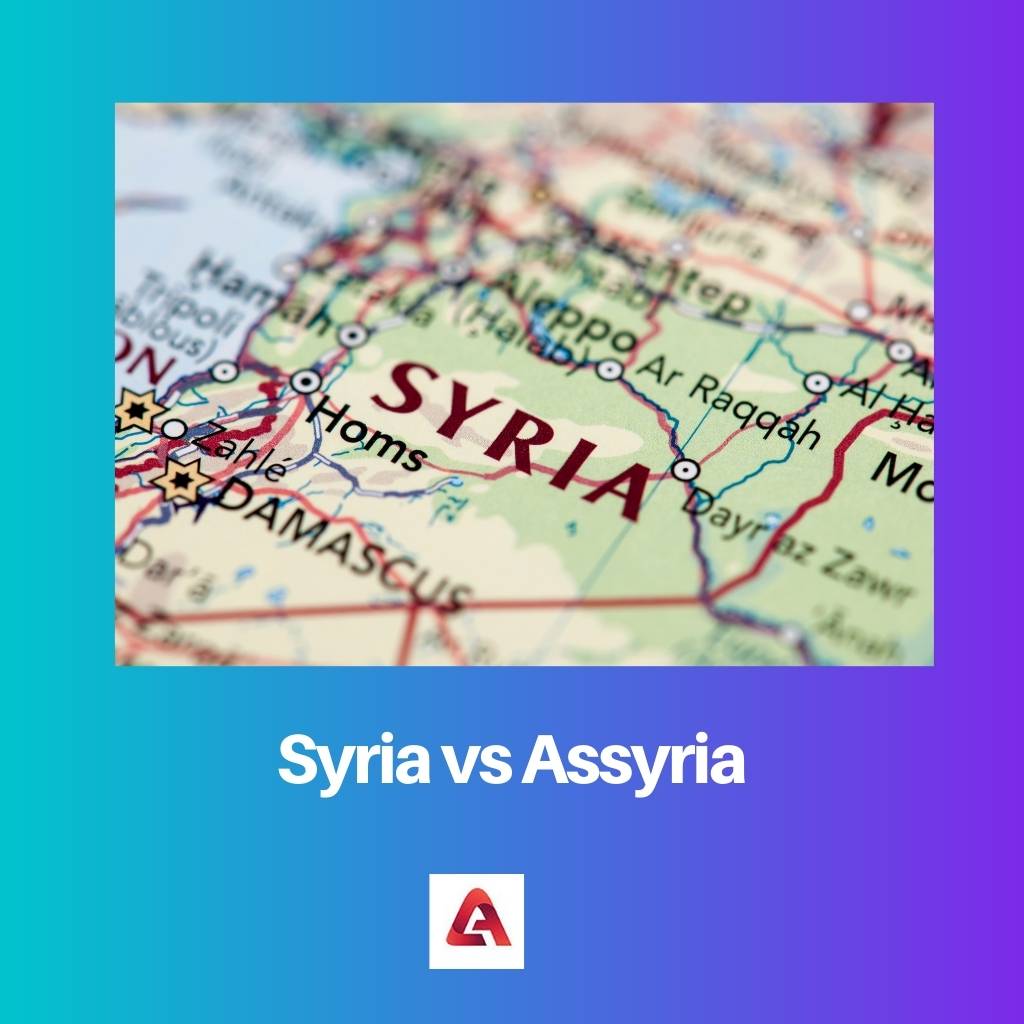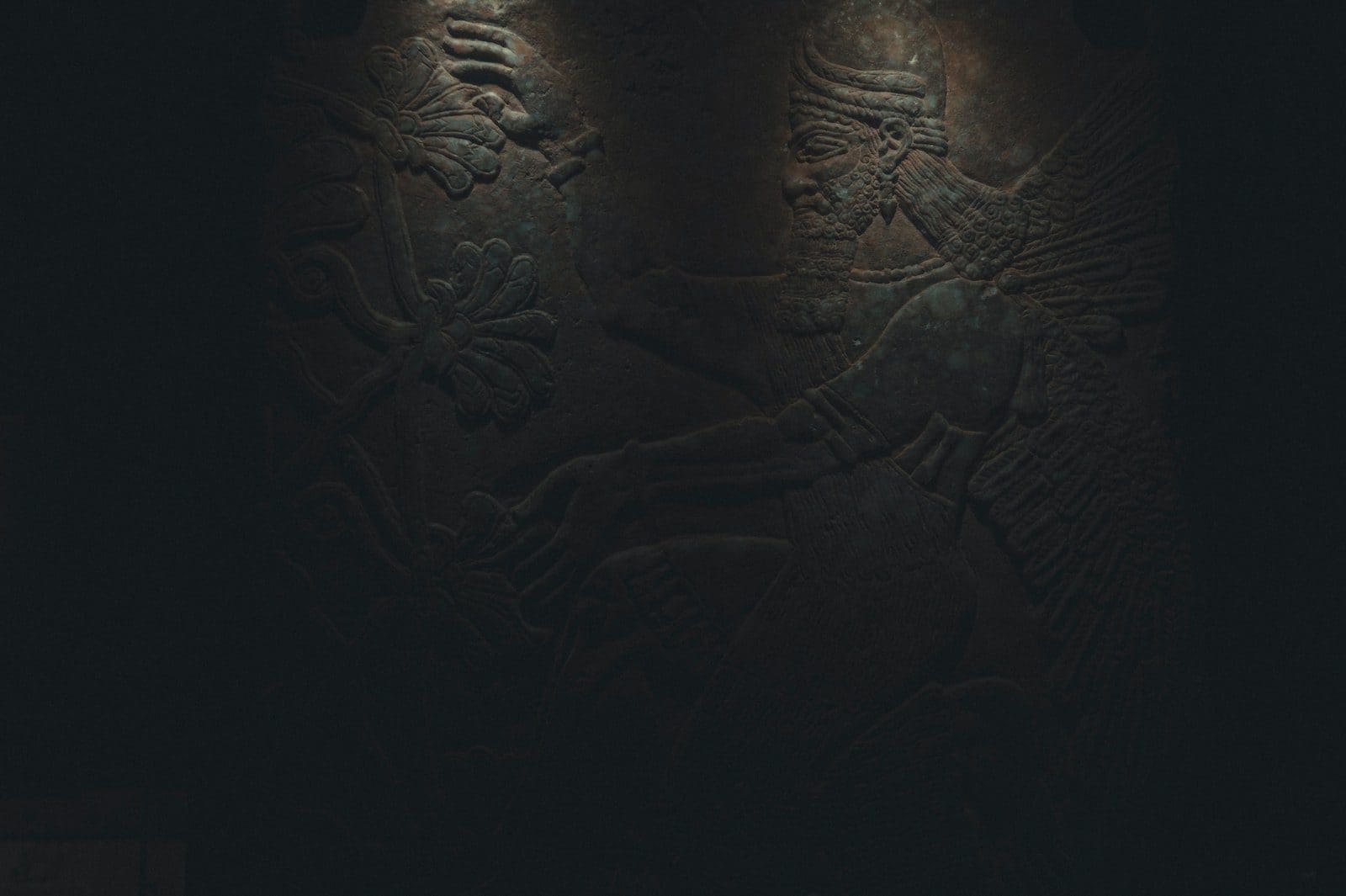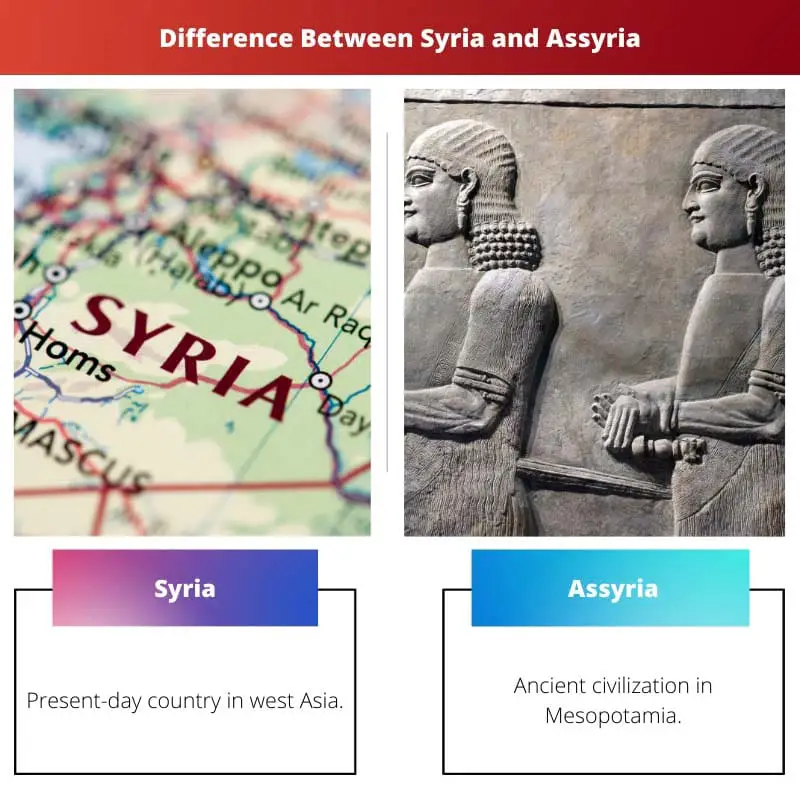The word Syria and Assyria confuse people. They are thought to be the same places, but they have many differences.
Though they can be called as same places, while the first one is a modern term, the latter is an ancient term or, say, an ancient civilization that no longer exists. Sometimes Syrians are thought to be the descendants of the early Assyrians.
However, Assyrian descendants are still found over the globe, although the region has ceased to exist. Both words are thought to have the same etymology though they do not.
Key Takeaways
- Syria is a country in Western Asia, while Assyria was an ancient civilization in Mesopotamia (present-day Iraq).
- Syria is predominantly Arab and Muslim, while Assyria was home to several ethnic groups and religions, including the Assyrians, Babylonians, and Persians.
- Syria has a rich cultural heritage, including architecture, literature, and cuisine, while Assyria is known for its science, mathematics, and astronomy advances.
Syria vs Assyria
Syria’s official name is Syrian Arab Republic. It encompasses a few areas of prehistoric Assyria, the Eastern Mediterranean shoreline, and the Syrian desert. While Assyria was a prehistoric civilization. The Assyrians were Semitic people who lived in what is now modern Syria and modern Iraq.

Syria, called the Syrian Arab Republic, is a modern-day country in west Asia. It shares its international borders with Israel, Jordan, Turkey, and Iraq. The capital of the country is the oldest city inhabited, called Damascus.
The country has a majority of Muslim population and uses the Arabic language. It gained independence from a French territory in 1946.
Assyria was an ancient civilization in the region of Mesopotamia. It was established after the division of the Akkadian empire, the north part being Assyria, and the south was called Babylon.
It consisted of regions of current Iraq, present Syria, and parts of turkey and other neighbouring countries. It had a Semitic population.
Comparison Table
| Parameters of Comparison | Syria | Assyria |
|---|---|---|
| Meaning | Present-day country in west Asia. | Ancient civilization in Mesopotamia. |
| Etymology | It was named after King Cyrus, who, in 1500 BC, ruled the region of present-day Syria. | It is named after the city of Assur. |
| Geographical location | Constitute of some regions of Assyria, the Syrian desert and the coastline of the Mediterranean sea. | It consisted of current Iraq, present Syria, and parts of Turkey and other neighbouring countries. |
| Community | 90% Muslims and the rests are Christians and Druze. | The Semitic community has the majority of Christians. |
| Language spoken | Arabic | Aramaic |
What is Syria?
Syria is initially known as the Syrian Arab Republic. The ancient kingdoms, such as the Umayyad civilization and Ebla civilization, along with the Mamluk Empire of modern-day Egypt, make up modern Syria.
Syria includes a small region of Assyria, the Syrian desert, and the coastline of the Mediterranean sea.
The geographical location of Syria can be described as between the borders of the Mediterranean sea and western Asia, having Iraq in the east, Lebanon in the west, Jordan in the south, turkey in the north, and Israel in the southwest.
The oldest city in Syria is Damascus, also Syria’s capital. In the country, 90% of its population of Muslims, having a share of 74% Sunni and 13% Shia Muslims.
The rest of the population comprises 10% of Christians (Armenians, Arab Christians, and ethnic Assyrians) and 3% of Druze.
After the first world war, Syria was established as a French mandate. Syria gained independence in 1946 and achieved parliamentary republic status soon after. Now, Syria is known as the Syrian Arab republic.
The name Syria came from the name of King Cyrus, who, in 1500 BC, ruled the region, which is now present-day Syria.

What is Assyria?
Assyria was an ancient civilization around the twenty-third century BC and 608 BC. It was situated on the banks of the river Tigris.
The place is today’s modern era in Iraq. Assyria was initially named after Assur city and was known as Subartu, Ashura, and Asuristan.
After the demolition of the Akkadian empire, which was extended from river Furat to river Dalja, the existence of Assyria took place.
After the kingdom’s fall in 2154 BC, the united country (with different territories having different leaders having the Akkadian tongue) split into two parts: the north was called Assyria, and the south was called Babylon.
The Assyrians were originally Semitic people, and its geographical area was somewhat of modern Syria and present Iraq before the Arabs invaded Assyria to make it their civilization.
The language spoken in Assyria was Aramaic. The Assyrians opted for Christianity and were among the first communities to do so. Their descendants form a minor population of turkey, modern Iraq, Northern Syria, and western Iraq.
The Assyrian descendants can also be found in Sweden, Russia, Germany, Australia, Jordan, Armenia, Israel, etc. The distribution of Assyrian descendants took place after the 1990 Iraq war.

Main Differences Between Syria and Assyria
- Assyria belonged to an ancient civilization consisting of Semitic people, while Syria is a modern-day country having a majority of the Islamic population. They are Arabic.
- Assyria consisted of part of the region that today is modern Syria and present-day Iraq. Syria consists of some areas of Assyria, the Mediterranean east coastline, and the Syrian desert.
- Assyrians spoke the Aramaic language, while Syrians spoke the Arabic language.
- The Assyrian population consisted of most Christians, while Syria has approximately 90% of the Muslim population.
- Assyrians existed way before the Syrians and the Arabs, while Syrians were mainly Arab Muslims.




